

PopEntertainment.com >
Oscar Nominees >
Feature
Interviews - Actors > Feature Interviews U
to Z > Ken Watanabe
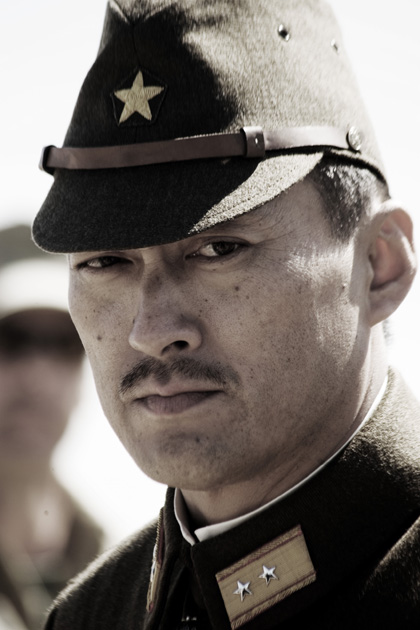
KEN
WATANABE
CINEMATIC SURVIVOR
by Brad Balfour
Copyright ©2006 PopEntertainment.com. All rights reserved.
Posted:
December 29, 2006.
With Oscar-nominated Japanese actor Ken Watanabe playing General Tadamichi
Kuribayashi in Letters from Iwo Jima, director Clint Eastwood
assured audiences that he employed a actor equal in stature to the
commander who held the island of Iwo Jima for several weeks against
overwhelming odds. The Battle of Iwo Jima was one of the fiercest
struggles of the Pacific theater of World War II, with over 20,000
Japanese and 7,000 American casualties. Early in the battle, during
February 1945, an American flag was raised on top the high point, Mount
Suribachi, and the subsequent photograph of the raising became an American
icon as a powerful inspiration of the Allied cause.
Told from the Japanese point of view, this companion piece to Flags of
Our Fathers provides not only a fresh view of the war but an anti-war
statement that demonstrates both the humanity of the enemy – in this case
the Japanese soldiers – and the extremes that their sense of honor
provoked with utterly futile results.
The 45-year old Watanabe brilliantly expressed Kuribayashi's military
intelligence (he set up a series of tunnels that extended the Japanese
resistance by weeks), his sense of duty, and respect for his men as well
as a healthy respect for the Americans; he had spent time living in
California before returning to Japan at the advent of war. And once again,
against the odds, this film – shot almost entirely in Japanese and with a
mostly Japanese cast – is being touted as Oscar-worthy.
But this isn't the first time that Watanabe intersected with the West both
on and off-camera; in The Last Samurai he played Katsumo, the
samurai leader who led a rebellion against the elected Japanese government
(and garnered a Best Supporting Actor nom) and in Memoirs of A Geisha
he was the Chairman. Though his career was nearly derailed by a bout with
leukemia, Watanabe has paid his dues, starting out in theater and then in
doing historical dramas such as Dokugan ryu Masamune – playing a
samurai hero that made him a household name in Japan. Such films as
Tampopo and Kizuna established him as a full-fledged film actor
and now, one willing to do an interview entirely in English.
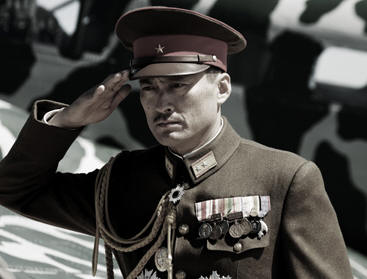 One
of the goals of the Japanese military in the '30s and during the war was
to connect its rank and file to the past glory of the samurai and the
traditions of fealty and honor. Did your previous roles as a samurai help
you to understand this militaristic mindset?
One
of the goals of the Japanese military in the '30s and during the war was
to connect its rank and file to the past glory of the samurai and the
traditions of fealty and honor. Did your previous roles as a samurai help
you to understand this militaristic mindset?
My character carried the spirit of the samurai, but he was also a very
rational person. He had studied for five years in both the United States
and Canada. He completely understood the American way: its culture,
customs, economy, industry, everything. So it wasn't easy for him to fight
against the United States. He struggled a lot before going into battle. In
the end, though, he focused on the task at hand by reminding himself that
he was fighting in the name of his country and his family.
Did you ever wonder what it would have been like if you had been in the
war yourself?
I find it almost impossible to grasp such an idea. It's overwhelming.
Was it important to make a statement at this time about the experience
of the Japanese during the war?
Iraq
has led us to reexamine war.
Clint did not want to romanticize the war. Japan's history is very rich
but also very sad, and he wanted to portray the war realistically. Of
course, the movie may conjure up feelings about the war in Iraq, but our
intention was not to comment on Iraq.
Was the message of this film that war should be avoided?
Yes.
Since we've been engulfed in so many ongoing wars, how would you
explain the importance of seeing this film to someone who doesn't even
like films about war?
I didn't really have strong feelings about war before shooting, one way or
the other. But after doing the film, my eyes were opened to its
atrocities. I feel deeply for anyone who has had to live through something
like that.
So even the person who's not interested in war movies, they'll get this
message?
Yes, it reflects an unfortunate aspect of reality, but it must be brought
to light.
What did you do in preparing for this film; did you meet with anyone
who helped you get a perspective on the experience?
I play the role of a commander so I had to familiarize myself with
military processes and warfare. I asked myself, "Why did Japan start the
war?" I wanted to know all the decisions that eventually led up to the
tragedy. I found myself frustrated with some of the decisions that were
made back then.
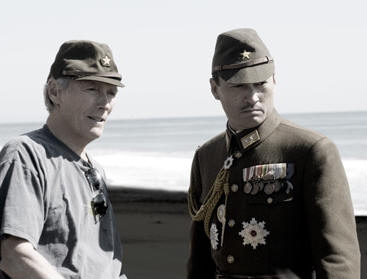 In
researching this film, did you come away with an understanding or
knowledge that you didn't have beforehand?
In
researching this film, did you come away with an understanding or
knowledge that you didn't have beforehand?
Unfortunately, most Japanese people aren't aware of this tragedy; even I
didn't know until I did the film. It's difficult to say why, but perhaps
it has something to do with the lack of a good education. This film deals
with only one of many tragedies in the history of the world, but hopefully
it will get people to think more about these forgotten incidents.
What was your toughest challenge in this movie?
When Clint approached me about this project, it posed a great personal
challenge for me. There was a lot of pressure. Here I am as a Japanese
actor and I'm being asked to represent a true historical account of my
country. There were thousands and thousands of casualties on this island,
so it was a big deal for me.
You felt responsible to give voice to your country.
Yes.
What was it like working with Clint on set?
You would think that the set on a war movie would be chaotic – lots of
dirt, sweat and noise. It was actually pretty calm. We were depicting such
intense and violent incidents, but everyone was at peace. I almost forgot
that we were shooting a war film.
Did you help with the casting?
I helped a little bit. I made suggestions to Clint that so-and-so was
great at this and someone else was great for that.
Had you worked with any of the other actors before?
I'd worked on four occasions with Tsuyoshi Ihara [Baron Nishi].
Really? Were they samurai films?
Yes, they were made in Japan.
Going forward, do you want to continue exploring the intersection
between Japanese and Western culture or do something totally different?
Honestly, I have no idea. I tried Memoirs of a Geisha last year and
this year I did a film in Japan about an Alzheimer's patient [Ashita no
Kikoku /Memories for Tomorrow; Watanabe was both the lead and
executive producer] that I'm trying to get distributed here. I did a lot
this year, so I'm just sitting on these films and looking forward to
future opportunities [he is rumored to play Kenuichio Harada/Silver
Samurai in Wolverine].
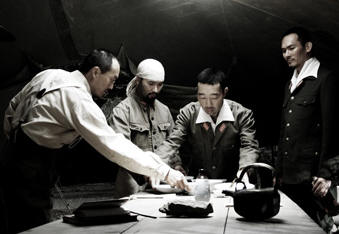 Was
it different working with an American director rather than a Japanese one?
Was
it different working with an American director rather than a Japanese one?
Each director, no matter where he's from, has a different personality and
style of work. As actors, it's our job to become comfortable with that
factor and adjust to the changing demands.
How was the preparation for this movie different from that of Last
Samurai?
It was harder because Letters deals with material that is much
closer to our era. But we had great source materials from both the
American side and the Japanese side. We had access to American survivors
as well as Japanese survivors. So we had a very well-rounded final
product.
Geisha was an interesting attempt at introducing elements of
traditional Japanese culture to Americans. Do you think Americans are
beginning to appreciate and understand Japanese culture more?
In a few years, perhaps more nations will have a better understanding of
each other. That's something we have to do – educate each other on our own
cultural differences.
Because Letters is shot in Japanese it is an interesting
contrast to Memoirs of a Geisha which was done in English. Do you
feel that Letters from Iwo Jima offers a more authentic experience?
Memoirs was the vision of director Rob Marshall. Letters
tries to remain true to Japan's history, so it made sense to make this
film in Japanese. Clint understood that and he was really open-minded. He
had us translate the dialogue from English to Japanese – the original
script had been drafted in English. We also wanted to do everything we
could to see through the eyes of the Japanese soldiers, and to that end,
we put in a lot of research.
People spoke Japanese in a more formal and "appropriate" way in those
days.
Each character had a different background. They came from different places
and had nuances in their speech that set them apart from each other. I
tried to be as attentive to details as possible throughout the entire
process of filming.
Did you go and see the
Iwo
Jima memorial?
Yes, we all went on the last day of shooting. We prayed together at the
memorial for both countries, then we took a photograph. The prop master
took out an American flag and a Japanese flag and we held both. I realized
just then the real significance of this film. Many years ago, we were
enemies; now we are collaborating on this film together. We understand
each other much better.
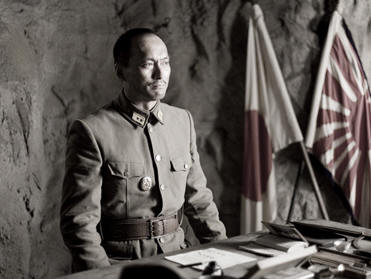 Did
you bless this film like you did with Memoirs of a Geisha?
Did
you bless this film like you did with Memoirs of a Geisha?
I gave a good luck charm to Clint.
What do you think about the critics' awards that Letters from Iwo
Jima has picked up in the past two or three weeks?
It's great because the awards will bring more people to see the film. It
really has been my privilege to take part in this special project. The two
movies offer two contrasting perspectives on the tragedy. I think it's
important to see things from different angles because it opens up our
minds to unfamiliar things.
Are you more prepared for the big Oscar campaign that's going to be a
push for this movie, as opposed to Last Samurai, which was
obviously very new to you?
No [laughter].
Come on, you should get nominated! What would you think if you were to
be nominated?
I'm very honored to be a part of this project. It's a great opportunity to
bridge the gap between two countries that had gone to war in the not too
distant past. I'm humbled.
Clint Eastwood produces, he directs, he writes. Do you have the same
aspirations?
I learned a lot from him. He usually follows his convictions and that's
important for filmmakers. I think I need some more experience under the
belt – maybe another 30 years – before I can begin to follow in his
footsteps [laughter].
He started making his own movies when he was your age. Do you have a
favorite Clint Eastwood movie?
Unforgiven. I was so surprised. It's much different from the
traditional Western film.
Did you see it in Japanese or English the first time?
With subtitles, of course! [laughter]
What is on your list of favorite films? Which Japanese or American
films have influenced you?
It's hard for me to say; I'm undecided.
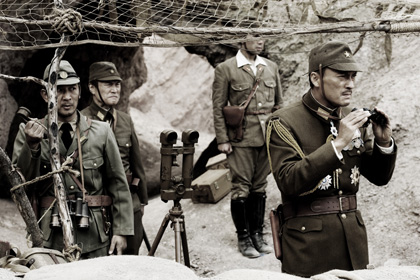 You
don't have any favorite directors? Besides Clint, of course.
You
don't have any favorite directors? Besides Clint, of course.
Working with Clint was the best experience of my career.
You've worked with American and Japanese directors. Do you have plans
to work with more foreign directors?
I hope to do so in the future. Perhaps other Asian directors, or
Europeans, or maybe South Americans. It doesn't matter to me. Bring them
all on!
You played Ra's al Ghul in Batman Begins. Are you interested in
doing more work in the action genre?
Yes. I'd like to be in Pirates of the
Caribbean 4
maybe [laughter].
Would you like your character in the Batman film to make a
return?
Yes, my character didn't die.
No talks yet?
No.
We'll be pushing for it [laughter]. You can be an action star
with a gun in each hand?
Yeah, sometimes I think so.
Do you still live in
Japan?
Most of the time. My children moved to California last summer. I go back
and forth between different places.
So you live in
California sometimes. How do you like that?
My son likes his school and all his friends. We're very comfortable.
How old is he?
Eleven.
Is he teaching you some more English?
Hopefully.
What is coming up or underway?
I have no idea. You know, I just want to rest.
Email us Let us know what you think.